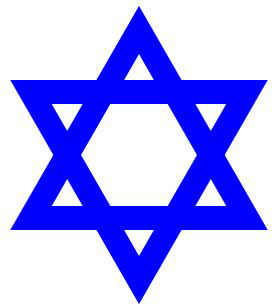Judaism

Judaism regards itself as the religion of the descendants of
Jacob (later ‘Israel’), a grandson of Abraham.
The historical writings of the Egyptian and Mesopotamian
kingdoms are records of events at the time they occurred; they were not researches into the past to discover
national origins. Only Israel was a nation with a sense of its history. It was a history rooted
in a single and unforgettable event: the Exodus from Egypt under a leader named Moses. Over a period of
centuries Israel compiled the documents of its national history and preserved them in what is known as the Hebrew
Bible. Remarkably, there was no attempt to color the record to make Israel look good to its descendants or to
anyone else.
The Jewish Bible contains 24 books divided into 3
sections:
1) The Law.
The Law consists of the first five books: 1) Genesis, 2) Exodus, 3) Leviticus, 4)
Numbers, and 5) Deuteronomy. Also referred to as the ‘Torah’ (“to teach”), the ‘Five Books of Moses’ or the
‘Pentateuch’, from a Greek term meaning "five scrolls”. The story of the Torah concerns Israel’s foundation
and how its people are called on to serve as a positive example to other nations.
2) The Prophets.
The prophets were ancient Israelite preachers who spoke to the nation on behalf of
God. Their purpose was not to foretell the future, but to interpret Israel's behavior in the light of God's laws
and to condemn improper behavior. The prophets declared that Israel would be punished for breaking the laws and the
series of disasters that eventually befell Israel seemed to prove their warnings: Israel was conquered by Assyria,
Babylon, Persia, Greece, and Rome over a period of seven centuries. The Prophetic books are divided into two
groups:
1) Former Prophets - the books Joshua, Judges, Samuel, and Kings. In the Christian
Old Testament these are considered historical narratives rather than prophetic works.
2) Latter Prophets – books of Isaiah, Jeremiah, and Ezekiel, plus a group of shorter
books called the Twelve. In the Christian Old Testament, the Twelve are called the Minor Prophets specifically
Hosea, Joel, Amos, Obadiah, Jonah, Micah, Nahum, Habakkuk, Zephaniah, Haggai, Zechariah, and
Malachi.
3) The Writings
The Writings do not have a central theme or unity like the Law and Prophets.
They are used for aids in worship and for teaching. The Writings books are divided into three groups:
1) Practical Wisdom: book of Proverbs. Wise sayings, maxims, parables and
aphorisms which attempt to instill sensible attitudes for the conduct of life. Speculative Wisdom: books of
Job and Ecclesiastes. Good vs. Evil; Right vs. Wrong; Justice vs. Injustice; the sufferings of innocent people; why
the wicked are so often successful & prosperous.
2) Short Stories: Books of Ruth, Esther & Daniel. History of Israel and
visions.
3) Poems & Songs: Song of Songs, Lamentations, Ezra-Nehemiah, Chronicles
& Psalms. The Song of Songs is a collection of love poems, often ascribed to Solomon, king of Israel after his
father David (approx. 1000 BC). Lamentations is a collection of five poems, mourning the fall of Jerusalem
(587 BC) by the armies of the Babylonian Empire. Ezra-Nehemiah and Chronicles are interpretations of the
history of Israel. The most popular book is Psalms (Greek for "song"), a collection of hymns and songs. The book is
often called "Psalms of David”.
z
| 